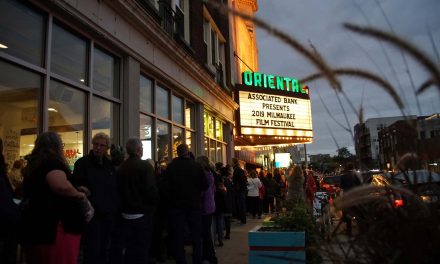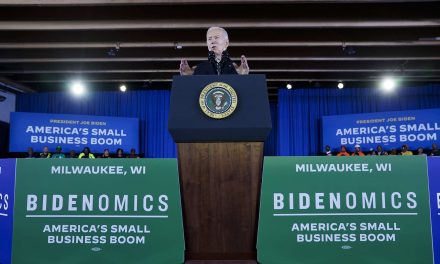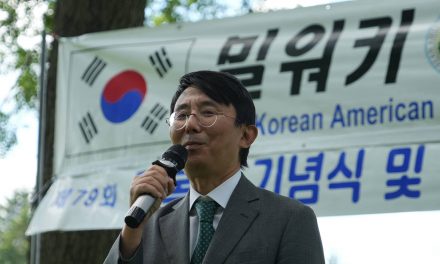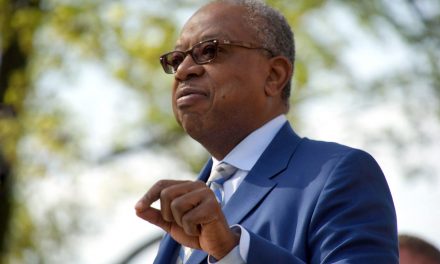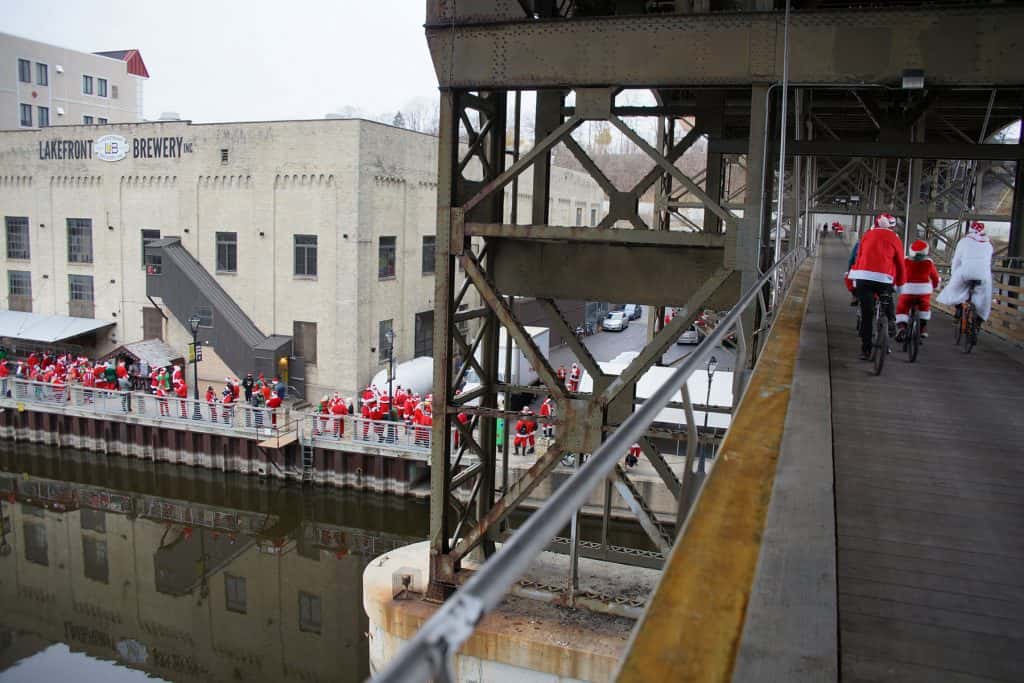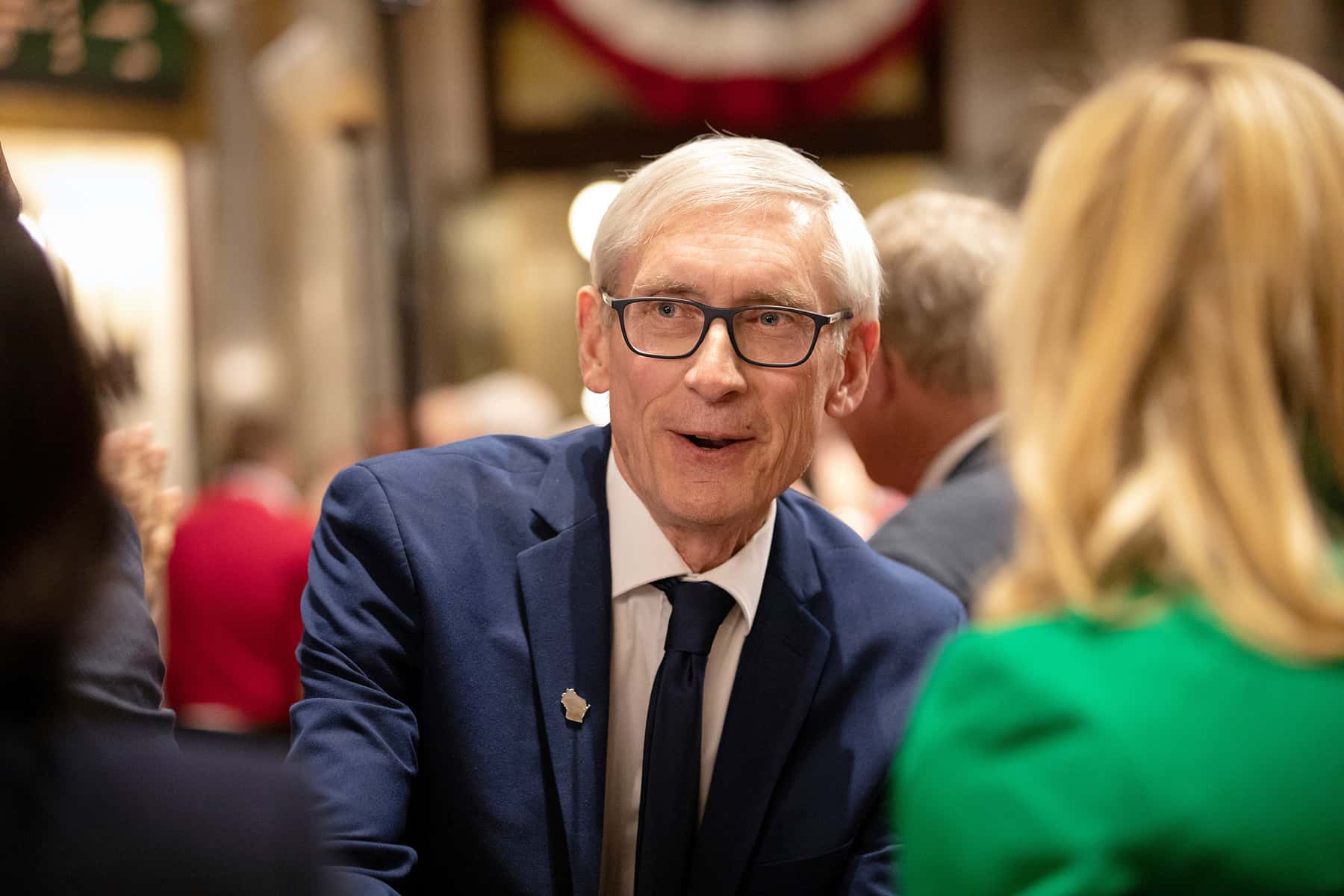
Wisconsin Governor Tony Evers issued a blueprint on February 28 for reshaping state government after eight years of GOP control, proposing a boost in the minimum wage, the repeal of drug testing for those on food stamps and a goal of all electricity produced in Wisconsin being carbon free by 2050.
The state budget also would increase Wisconsin’s gas tax by 8 cents a gallon. The Governor’s office estimated that would cost the typical driver $3 a month and contribute to a $520 million bump to the transportation fund over the next two years. But he also coupled that hike with a call to eliminate the minimum markup on gas, which his administration said would largely blunt the impact of the gas tax increase.
Governor Evers is also seeking a tax credit cap for manufacturers, limit exclusions for capital gains, and an update of the state’s tax code to match federal law. Those moves, combined with efforts to improve collections of what is already owed the state, would generate $1.6 billion in additional tax money.
Proposed tax breaks for middle- and low-income Wisconsinites would total $951.4 million. For a family of four, that could amount to $500 in savings. Governor Evers said his budget was not “the Tony Evers budget, the Democratic budget, the speaker’s budget, or the Republican budget” but what he called “the people’s budget.” Warning lawmakers against playing politics with the document, Governor Evers said that the stakes were too high.
“At times, we’ve succumbed to the trivial pursuit of political posturing. At times, we’ve let partisanship cloud the opportunity for compromise. And at times, we’ve let power be the enemy of the good,” Governor Evers said. “So, I want to be clear: this can’t be one of those times.”
After engineering a lame-duck session to remove the Governor’s authority, it was no surprise that GOP leadership quickly denounced the plan using familiar political rhetoric. The objections came most directly because the plan would repeal almost all of the changes Republicans pushed through in the December extraordinary session, just before the new Governor and new attorney general took office. The Republican efforts were widely seen as an attempt to undercut the incoming administration.
Governor Evers had already rolled out a series of proposals in recent weeks. However, the budget address on February 28 was the first time that he provided details on his full vision for the state’s new direction. Other highlights of the budget plan by Governor Evers included:
ROADS: The state’s 32.9-cent gas tax would go up 8 cents, but the state’s minimum mark-up law on fuel that results in a roughly 9 percent increase in the price of gas would be eliminated. Gas taxes would automatically increase with inflation. Evers said the net effect could be a par-gallon decrease of as much as 14 cents. Heavy truck registration and new car titling fees would increase, but the $75 vehicle registration fee most car owners pay would not change. Borrowing for roads would be the lowest level in 20 years, while $320 million in new money would go toward highway repair and expansion.
LAME DUCK: Most of the law changes approved by Republicans during a December lame-duck legislative session that weakened powers of the governor and attorney general would be repealed. That includes changes that required legislative approval to withdraw from lawsuits or settle lawsuits, the governor’s powers to make rule changes and restrictions on his influence over the state’s economic development agency.
UNDO WALKER: Wisconsin’s “right-to-work” law would be repealed, and prevailing wage requirements would be reinstated. Both changes were fought by unions when enacted under former Republican Gov. Scott Walker. The budget would also undo work and drug testing requirements Walker instituted to qualify for food stamps, qualify for Medicaid and other public aid programs.
MARIJUANA: Medical marijuana would be legalized and possessing up to 25 grams of recreational pot would be de-criminalized. The plan appears to be a non-starter among Republicans.
AUTOMATIC VOTER REGISTRATION: State elections officials are required to work with the Department of Transportation to implement automatic voter registration as soon as possible. Sixteen states have automatic voter registration. As people apply for or renew a driver’s license they’re either automatically registered to vote or asked whether they would be automatically registered.
K-12 SCHOOLS: Funding for K-12 schools would increase by 10 percent, or $1.4 billion, and the complex state aid formula would be rewritten. The state would pay at least two-thirds of school costs through aid, and a ban on how many times a district could ask voters to exceed local property tax limits would be repealed.
VOUCHER SCHOOLS: Enrollment in voucher schools would be frozen starting in 2021, a move Republicans oppose. Evers would also do away with an income tax deduction for private school tuition, which would raise about $12 million a year.
HIGHER EDUCATION: A tuition freeze at the University of Wisconsin would continue for at least two years, with overall funding increased by $150 million. Residents of other countries who have graduated from a Wisconsin high school, spent at least three years attending a Wisconsin high school and are pursuing U.S. citizenship could pay in-state tuition at UW schools and state technical colleges. Republicans oppose the in-state tuition plan, a version of which they stripped from state law in 2011.
DRIVER’S LICENSES: The budget would make people who are living in the country illegally eligible for driver’s licenses and identification cards.
TAXES: Income taxes for the middle class would be cut 10 percent. He would also limit a 30 percent capital gains exclusion to single people earning less than $100,000 and couples earning less than $150,000. That would bring in $500 million over two years. A new child care tax credit equal to 50 percent of the same federal credit would be created. First-time homebuyers could subtract up to $5,000 a year, $10,000 for married couples, in accounts to pay for home purchases that would grow tax-free.
E-CIGARETTES: The budget would impose a tax on all e-cigarettes and vaping products equal to 71 percent of the product’s list price. The tax rate mirrors the existing rate on traditional cigarettes and other tobacco products.
HEALTH CARE: Evers would accept federal Medicaid expansion , a move that would add about 82,000 low-income people to Medicaid and save the state about $320 million over the next two years thanks to an infusion of federal dollars. But Republicans have been outspoken against it, saying putting more people on Medicaid will shift costs to the private sector and ultimately cost the state more in later years.
CORRECTIONS: The budget doesn’t set aside any money for building a new prison to deal with overcrowding, but it does call for building an additional barracks at two prisons to house more than 400 inmates. The budget also would establish a new pay progression for guards and bump starting pay from about $16 an hour to $18. Evers has said he wants to reduce the overall population but the budget doesn’t include any early release initiatives that would accomplish that.
YOUTH PRISON: Evers calls for indefinitely delaying closure of the troubled Lincoln Hills juvenile prison, while spending nearly $200 million more on smaller replacement facilities. He also called for raising from 17 to 18 the age that offenders are considered adults for most crimes.
CRIME ANALYSTS: The budget gives Attorney General Josh Kaul money to create 17 more crime lab analyst positions and sets up a pay progression for lab workers. The labs have been plagued for years by slow turnaround times for evidence test results.
NATURAL RESOURCES: Evers wants to borrow nearly $70 million more over the next two years to combat water pollution and replace lead pipes. He also proposed adding five scientists at the state Department of Natural Resources to research water pollution and five positions to regulate factory farms.
DARK STORES: Evers calls for closing the “dark stores” loophole that allows big box retailers to save millions of dollars in property taxes by assessing the value of their active stores as if they were vacant.
PLANNED PARENTHOOD: Nearly $28 million would be spent to support women’s health care issues, including restoring funding available to Planned Parenthood that was blocked by Walker.
REDISTRICTING: Evers proposed a nonpartisan redistricting process that would take away the Legislature’s power to draw political boundary maps, a move he said would stop partisan gerrymandering. Republicans support the current process. The next round of redistricting will occur after the 2020 census.
PROPERTY TAXES: Property taxes would increase on average $50 in each of the next two years on the median-valued home. That’s a 1.7 percent increase. The median-valued home is $173,646.
ECONOMIC DEVELOPMENT: Evers campaigned on defunding the state’s job-creation agency, the Wisconsin Economic Development Corp. But since winning election, Evers backed off on eliminating WEDC and instead will propose tightening restrictions on tax breaks it gives companies.
MINIMUM WAGE: Evers campaigned on raising the minimum wage to $15 an hour. His budget would increase the minimum wage by $1 to $8.25 beginning in 2020, and raise it to $9 an hour in 2021. It would then go up 75 cents per year in each of the next two years, and then it would go up according to inflation every year after that.
CLEAN ENERGY: The budget calls for eliminating coal from all electricity production in Wisconsin by 2050.
Spending under the $83.4 billion, the two-year budget would increase 5.4 percent the first year and 4.9 percent the second. The state’s $616 million budget surplus would be just $20 million by mid-2021 under the Evers plan. Governor Evers urged lawmakers to focus on the pressing issues facing Wisconsinites.
“Their plight must be our purpose, their crises our cause and their desires our demands,” said Governor Evers.
2019 Budget Address
2019-21 Biennial Budget Address: Governor Tony Evers
I’m Tony Evers, and I’m incredibly proud to be here as the 46th governor of Wisconsin announcing my first biennial budget for our state.
You know, I guess you might say I’ve spent some time in education for give or take a handful of years. And one of the most important lessons I took away from my time in the classroom is that you learn more from listening that you ever do from talking.
So, after Mandela and I were elected, we decided we wanted to do a listening session tour across Wisconsin. We wanted to hear directly from the people of our state about what they wanted to see in the budget I’m announcing here tonight.
But we didn’t want to show up months later with a budget in hand and say, “So, what do you think?”
We said we’d always put people first. That’s why we wanted everyone to be part of finding these solutions together.
So, what we did was we turned the standard listening session formula on its head. And, by golly, the darndest thing happened: people showed up from different backgrounds and different communities, and they sat and they talked to each other. And they listened to each other’s perspectives. And they had a dialogue about the problems our state is facing and the best way to fix them. And they ranged from Republicans to Democrats to the democratically disenfranchised to the politically apathetic. And sometimes they even disagreed, but they did so amicably. Never with elevated voices. Never out of spitefulness. And never with disrespect.
I know in today’s day and age, what I’m describing might sound like a unicorn phenomenon of sorts. But the good news is we managed to capture proof it actually happened, and I’d like to share that with you tonight.
Now, I showed you this tonight for a few reasons. The first, although I said it tongue-in-cheek, is to show that people really can get along. If Wisconsinites can come to a room armed with different ideas, listen to each other, and compromise on solutions, then we should be able to do that in this building, too.
Second, I want everyone to understand how we arrived here. At the end of the day, our budget is about putting people first. It’s about creating a Wisconsin that works for everyone–a Wisconsin for us. This isn’t the Tony Evers budget, the Democratic budget, the Speaker’s budget, or the Republican budget–this is The People’s Budget. And it’s one that we crafted together.
We heard from people like Maryann who lives in Coleman in Senator Tiffany and Representative Mursau’s district and Nancy who lives in Amherst in Senator Testin and Representative Shankland’s district. Both Maryann and Nancy came to our listening sessions and talked to us about water quality and water pollution issues across our state.
Because of people like Maryann and Nancy, we announced we’re making safe drinking water a top priority in Wisconsin. We’re authorizing nearly $70 million in bonding to address water quality, from replacing lead service lines to addressing water contamination across our state. I know Representative Shankland has been working with us closely on this issue. Thank you, Representative Shankland, and to Maryann and Nancy, who are here with us in the gallery tonight, for advocating on this important issue.
We also heard from people like Tony who lives in Senator Petrowski and Representative Snyder’s district in Wausau. Tony not only has a great first name, but he also came to one of our listening sessions and talked about why we need driver’s licenses for immigrants and persons who are undocumented, especially in communities where there’s limited access to public transportation.
Because of people like Tony, we’re announcing tonight that undocumented folks will be eligible to receive driver’s licenses and ID cards. This makes our roads and our communities safer, and helps strengthen our economy and Wisconsin families. I know Representative Zamarripa has worked on this issue, and Tony is here with us in the gallery tonight–thank you both for your work on this issue.
And finally, I shared that tonight so that everybody understands what’s at stake in choosing to play politics with this budget.
We have to be a better version of democracy than we have been in the past. At times, we’ve succumbed to the trivial pursuit of political outposturing. At times, we’ve let partisanship cloud the opportunity for compromise. And at times, we’ve let power be the enemy of the good.
So, tonight, I want to be clear: this cannot be one of those times. We cannot afford to play politics with this budget. Folks, the stakes are simply too high.
And as I told you in my inaugural address, I believe in leading by example. That’s why we’re going to begin tonight on the things about which we can all agree.
I’ve said all along that reforming our criminal justice system is an area where I know Republicans and Democrats can work together. So, earlier this week, I announced we’re going to return kids who are 17 to the juvenile justice system. And, I’m investing more than $200 million in additional funds so that we can get kids out of Lincoln Hills and get them closer to home as soon as we safely and responsibly can. I know there’s been bipartisan work on this issue in the past–thank you for your work on this issue, and I look forward to working together in the days ahead.
But juvenile justice is only part of a larger picture. We have to connect the dots in criminal justice by tackling this issue holistically. Starting the moment someone encounters the justice system to the moment they re-join our communities, we have to look at everything from alternatives to incarceration to equity in representation to substance abuse prevention to re-entry programming.
The criminal justice system starts in our communities. So we’re announcing tonight that we’re allocating $2 million over the next two years on a grant program for community policing through the Department of Justice in the 10 cities with the highest violent crime rates in Wisconsin.
But at the same time, we also need to come to terms with the fact that non-violent drug arrests are contributing to overcrowding and economic inequity, instability, and insecurity in our state. That’s why I announced a few weeks ago that our budget will decriminalize marijuana possession for 25 grams or less.
And we also have to ensure that once someone encounters our criminal justice system, they’re receiving adequate, fair, and vigorous representation.
So we’re increasing the private bar reimbursement rate to $70 per hour, and we’re providing more than 25 additional Assistant District Attorneys across our state. Under our plan, ADA positions will be the highest they’ve been since 2011. That will allow us to make sure the justice system is efficient and works for everyone. I know that Representative Born recently advocated for similar initiatives and that there’s been bipartisan support for this issue in the past. I’m hopeful these will receive bipartisan support in our budget.
Additionally, we need to make sure that while folks are incarcerated, they have the tools to be successful when they re-enter our communities. So, we’re expanding the Opening Avenues to Reentry Success program to all 72 counties, providing support to inmates who have mental health issues and are at risk of reoffending.
Finally, we have to make sure folks applying for jobs have the tools they need to maintain employment. So, we’re expanding the Windows to Work program by allowing the program in all minimum- and medium-security institutions, and that’s why we’re also announcing tonight that we will be “banning the box” statewide. We have to reduce employment barriers and empower the folks re-entering our communities with the skills and support they need to live a better life. I know Senator Taylor has been a tireless advocate on this issue–thank you for your work on this.
But fixing our criminal justice system is not the only area of this budget where we can find common ground.
Last session, Senator Darling and Majority Leader Steineke introduced and received unanimous, bipartisan support for legislation creating the Interagency Council on Homelessness. The Council was chaired by former Lieutenant Governor Kleefisch and offered recommendations for addressing homelessness in Wisconsin. I know that Republicans recently introduced legislation supporting portions of the Council’s ideas.
This is important work. That’s why just last week, I announced that I will be chairing the Council myself. And tonight, I’m proud to announce that we’re accepting each and every one of the Council’s recommendations and including them in our budget.
Homelessness and housing insecurity affects kids in the classroom, it affects our criminal justice system, and it affects economic development in our communities. We have to connect the dots on this issue, and it’s time we get serious about addressing this issue in Wisconsin.
Another area I think we can agree on and where we have to connect the dots is expanding access to broadband. Mary lives in Senator Wirch and Representative Neubauer’s district in Racine and came to one of our listening sessions this last December. She’s seen how businesses and schools are falling behind because of a lack of broadband and thinks this is a hindrance to advancing industries and technology. Mary told us, “Not having access to broadband flies in the face of any economic development.”
Mary is here with us in the gallery tonight–thanks for being here. Folks, Mary’s right. Lack of access to reliable broadband internet service affects families at home, and it also affects our classrooms, our hospitals, and building a strong economy. I know there has been bipartisan support on this issue in the past, and we absolutely have to double down on this critically important issue.
So, we’re setting a goal of attaining 25 megabits per second download and 3 megabit per second upload for all Wisconsin homes and businesses by 2025.
But we’re not just setting goals, we’re also going to make sure we actually have the means to achieve them. That’s why we’re making historic investments in broadband expansion grants, increasing total funding to more than $78 million over the biennium. That’s more than four times what was invested in broadband expansion grants during the last state budget. And we’re going to be targeting those grants to the unserved and underserved communities who need them most.
From broadband to homelessness to criminal justice reform, among many other things in this budget, there is much on which we can agree. I’ve said all along that I’m willing to work across the aisle to get things done. I’ve said all along that there’s more that unites us than divides us. We just have to choose to put people before politics. We have to do what’s best for the people of our state. And most importantly, we have an obligation to listen–truly listen–to what the people of Wisconsin need and what they are asking of us.
That starts with healthcare. I’ve said all along we need to expand Medicaid in Wisconsin, and according to a Marquette Law Poll, 62% of Wisconsinites agree. 82,000 more Wisconsinites will have access to affordable, quality healthcare coverage. And because we’re accepting these federal dollars, we have the opportunity to invest in programs that improve healthcare access and affordability across our state. It means that we can invest in programs to address infant mortality, and to encourage preventative care like cancer and STI screenings. It means we’re going to put our money where our mouths are–literally–to ensure Wisconsin isn’t among the worst states for dental care in the country. It means we can can expand access to substance abuse and mental health treatment, intervention, and stabilization, especially in our rural communities, for folks who are in crisis.
Additionally, the people of Wisconsin have asked us to fully fund our public schools. More than one million Wisconsinites have raised their own property taxes to support local schools in their communities. This is simply not sustainable. I’ve said all along that what’s best for our kids is best for our state, and investing in our kids will yield dividends for our future. So, we’re going to start with providing historic investments in K-12 education and returning to two-thirds funding at the state level.
In the past decade, we’ve not only cut public school funding, we’ve failed to fund programs for our kids with special needs. Erin is from St. Francis and lives in Senator Larson and Representative Sinicki’s district. Erin joined us for our listening sessions in December, and she talked about some of the gaps in our education system, and what more support and attentiveness would have meant for someone like her when she was growing up.
Erin said, “Special education is important to me because education itself is important, but sometimes students need extra support—for some students it’s a little, for some students it’s a lot. But if some of us don’t have the resources we need to access education, everyone loses in the end.”
Because of folks like Erin, we’re working to make sure kids like Mac and Abbey have the support and resources they need to be successful. So, as I told you during the State of the State Address, our budget includes an unprecedented $600 million increase in special education funding. We shouldn’t have to squeeze resources to make sure every kid can be successful. Erin, Mac, and Abbey are here with us in the gallery tonight. Thanks so much for being here.
We have to support our kids in the classroom, and we also have to make sure we’re supporting the educators who teach our kids, too. Wisconsin pays our public school teachers less than the national average, which makes it harder to recruit and retain talented educators. We need to do our part to make sure our educators know that the work they do is valued and to use these funding increases to do everything they can to keep our talented educators here in Wisconsin.
And we’re not just investing in K-12 education. We’re also going to get back into the business of funding public education at every level, including investing in higher education in Wisconsin. We announced this week that we’re increasing Technical Colleges funding by $18 million over the biennium and investing more than $150 million in our University of Wisconsin System. That means we’re able to freeze tuition for undergraduate residents in Wisconsin. But our universities shouldn’t have to sacrifice affordability for quality education. So, we’re not just going to freeze tuition, we’re also going to fund that freeze. And no one should have to struggle paying the bills because they pursued higher education. I’ve said all along that folks should be able to refinance their loans just like you can with a mortgage. That’s why I’m also bringing together State Treasurer Godlewski, DFI Secretary-designee Blumenfeld, and a member of the Higher Educational Aids Board, among others, to work on creating a Wisconsin-based strategy for student loan debt refinancing.
Finally, we’re going to make sure that, regardless of whether a kid was born in this country, if they went to a Wisconsin high school and have lived here for three years, they shouldn’t have to pay more for tuition like an out-of-state student–they should be treated like any other kid from Wisconsin.
In addition to funding public schools at every level, I believe everyone should have the opportunity to participate in our democracy. People should get to choose their elected officials, not the other way around. So, earlier this week, we announced that we’re creating a nonpartisan redistricting commission. And, as it turns out, the people of Wisconsin agree. According to a recent Marquette Law Poll, 72% of Wisconsinites want nonpartisan redistricting in Wisconsin. And not just Democrats. 63% of Republicans and 76% of Independents support nonpartisan redistricting, too. I know Senator Hansen has done extensive work on this–thank you for your leadership. Nonpartisan redistricting is only part of the democratic process and participation. So, we’re not only including nonpartisan redistricting in our budget, we’re also going to direct the Elections Commission and the Department of Transportation to work together on implementing automatic voter registration in Wisconsin. And I know Representative Crowley has been working on this issue–thank you.
Finally, we turn to transportation. I’ve said all along that our current approach to transportation is unsustainable. For years, we’ve kicked the can down the road on this issue, and we can’t afford to do it again. According to a 2018 TRIP report, industries like retail stores, tourism, agriculture, and manufacturing bolster about 1.4 million full-time jobs, and they depend on our roads, highways, and bridges. About $580 billion in goods are shipped across our state each year. Yet, our roads rank among the worst in the nation. And according to that same report, our infrastructure problems are costing Wisconsin taxpayers $6.8 billion annually in higher vehicle operating costs, traffic delays, and accidents.
That’s bad for our economy, and it’s bad for our pocketbooks.
It’s time to find a long-term solution to our transportation crisis, and that’s what I’m proposing to do here tonight. I said when I ran for governor that I’d get everyone to the table to find a solution that works for everyone. And that’s what we did.
And that’s why tonight, I’m proposing the largest biennial investment in transportation in Wisconsin state history. But this won’t be a one-time fix. We’re going to raise more than $600 million in new revenues to fix our roads, bridges, and highways and make sure that our transportation fund is sustainable for our future.
Now, I want to be clear: everyone is going to have to give a little to make this work. That’s compromise. We’re all going to have to share the burden so this is feasible for everyone, and to make sure we’re not passing the buck to the next generation. We’re going to be increasing fees for titles and heavy trucks, and we do have to raise the gas tax–but as I promised all along, we’re sure as heck not going to raise the gas tax by a dollar. We’re going to raise it $.08 a gallon–well below what they did over the river raising it by $.20 in Minnesota, or $.18 in Ohio. But the good news is, we’re also going to repeal a hidden tax that costs you $.14 a gallon on gas. That means our plan actually makes it possible for you to pay less at the pump than you do right now.
Because of all of this, we’re going to make sure local governments don’t have to rely on things like wheel taxes to make ends meet. So, we’re going to increase general transit and transportation aid to counties and local governments by 10% to repair local roads and local bridges. Those are the highest levels ever in Wisconsin history. And we’re going to do all of this without having to raid our general funds and without jeopardizing other budget priorities like expanding broadband, fully funding our public schools, and reforming our criminal justice system. Because of our long-term solution to this issue, Wisconsin’s highway bonding in our budget is the lowest it’s been in over 20 years. It’s time we pay our bills and stop kicking the can down the road.
At the end of the day, the people of Wisconsin expect and deserve for us to get to work on these pressing issues. From broadband to healthcare, education to justice reform, and roads to redistricting, these are the priorities of the people of our state. Their plight must be our purpose, their crises our cause, and their desires our demands.
You know, I’ve heard some remark that the people of Wisconsin chose divided government this November. I don’t think that’s the case. The people of Wisconsin didn’t choose for us to be divided, they chose for us to find it within ourselves to be united, not in party, but in promise–to serve our state, and to do what’s best for the people who sent us here.
Folks, let’s get to work.
Thank you, and On, Wisconsin!
Voices of Wisconsin
© Photo
Emily Hamer, Wisconsin Center for Investigative Journalism

